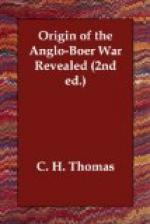In the usual intercourse with burghers and officials a great deal of exasperating and even humiliating experiences had often to be endured, Uitlanders being treated as an inferior class, with scarcely veiled and often with arrogant assumption of superiority.
I witnessed a field cornet enjoying free and courteous hospitality at a Uitlander’s house, while being entertained by his host and others in the vernacular Dutch, peremptorily object to the conversation in English in which the lady of the house happened to be engaged with another guest at the further end of the table. His remark was to the effect “that he could not tolerate English being spoken within his hearing”; this was in about 1888.
No wonder that under such conditions and ungenial usage Englishmen and other Uitlanders were put in a resentful mood, and many of them bethought themselves of methods other than constitutional to improve their position.
Identification was resorted to with the Imperial League, a political organization called into being in the Cape Colony to stem Boer assertiveness there and to restrain Bond aspirations. It was also seriously mooted to obtain the good offices of Great Britain as an influence for intervention and remonstrance.
It was not that the Transvaal Government was unaware of its duty and responsibility to remove causes which produced discontent and resentment among by far the larger section of the people under its rule. It seemed rather that the Uitlanders were provoked with systematic intention.
FOOTNOTES:
[Footnote 2: The Berne award has, as is well known, since been given.]
[Footnote 3: The Ermelo-Machadodorp branch.]
[Footnote 4: These very details were since made public in the Belgian Law courts in the recent cause celebre of “The Government of the South African Republic versus Baron Oppenheim.”]
MONSTER PETITION—JAMESON INCURSION—ARMAMENTS
It was at this stage in May, 1894, that a monster petition with some 25,000 signatures was presented to the Volksraad, setting forth the entire position, and praying for a commission to be appointed to examine the merits of the Uitlander complaints, and to frame a programme of reforms, the interests of the mining community needing such in a most urgent degree, not only for the sake of its own prosperity, but for the welfare of the entire State. A commission was indeed appointed, who reported in favour of the petitioners, and suggested a series of reforms; but the final Volksraad vote resulted in an angry rejection of the petition and denunciation of its organizers.
As on the occasion of previous memorials, some few abuses were redressed, but those benefits were made worse than nugatory by enactments in other directions of a still more galling nature. The petitioners found themselves snubbed and in the position of humiliating defeat.




